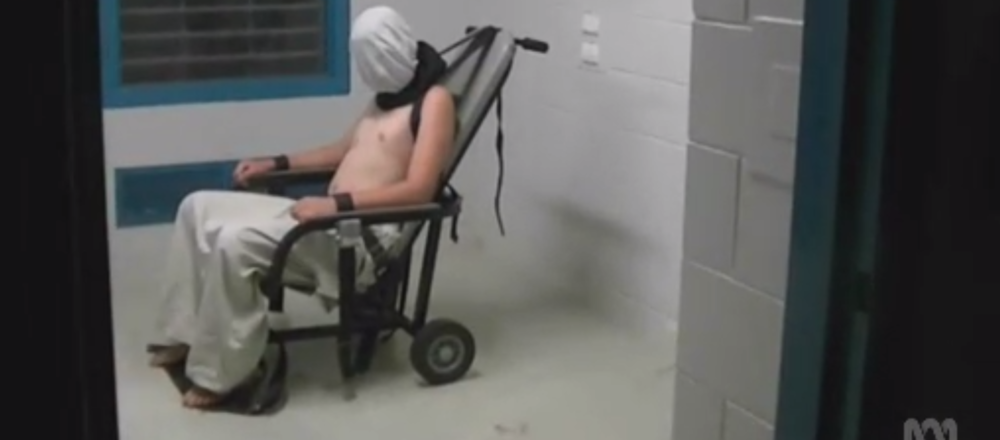In Florida earlier this year, a four-year-old boy found a gun in the car and fired it, shooting his mother through the car seat as she was driving.
No-one would hold a toddler criminally responsible. Instead, his mother was charged with offences relating to the insecure storage of a loaded gun.
Six weeks later, a two-year-old in Wisconsin did the same thing, only this time his mother was killed.
Young children can cause terrible injury, even death. At some point in their development, we begin to hold children responsible.
In the Northern Territory, children as young as ten are incarcerated and some have been horrendously mistreated. A breathtaking 97 per cent of juvenile detainees in the Northern Territory are Indigenous. Should a 10-year-old be in prison at all?
The international community has decided when a child should be held criminally responsible for their actions. By human rights standards, the minimum age is 12. Twelve is the absolute minimum, according to the United Nations (UN) Committee on the Rights of the Child, with no exceptions. And governments are urged to set it higher.
Australia is at odds with this standard. Children as young as 10 can be charged and tried for criminal offences throughout Australia. Our criminal codes must be revised to ensure no child below the age of 12 enters the criminal justice system. Below that age, problems of misconduct – however serious – ought to be treated as a welfare matter, with increased support and resources for families, carers and schools.
Our parliaments needn’t wait for the Royal Commission to make this straightforward reform to bring our laws in line with our human rights obligations.
Prisons, police cells, juvenile and immigration detention centres – where people are held under the total control of the state – are places where abuses of power are likely to occur. We would be naïve to assume the crimes allegedly committed against children at Don Dale are an exception, or that the perpetrators are somehow “bad apples”. The Stanford Prison Experiment of 1971 demonstrated how ordinary people readily become despotic in an authoritarian environment. Wherever people are deprived of their liberty by the state, we must take proactive measures to prevent abuses.
Any child deprived of liberty must be treated with humanity and respect for their inherent dignity, and in a manner which takes into account their developmental needs.
Don Dale is a powerful argument for why we need a bill of rights: to protect our most vulnerable and hold those in power to account. Australia has ratified numerous international human rights treaties, but has failed to write most human rights into domestic law, leaving gaping holes in the legal protection of our rights.
The right of children to be imprisoned “only as a measure of last resort and for the shortest appropriate period of time” – while guaranteed in the UN Convention on the Rights of the Child – is not mirrored in Australian law. Don Dale amply demonstrates our common law is also inadequate to protect our children from abuses up to and including suspected breaches of the UN Convention Against Torture (CAT).
Any child deprived of liberty must be treated with humanity and respect for their inherent dignity, and in a manner which takes into account their developmental needs. This is a universal right of every child. It seems so basic, yet we have not thought it necessary to protect these rights in our laws.
We must not use the NT Royal Commission as a reason to sit on our hands while we wait for recommendations.
Let us act swiftly to enact a bill of rights in Australia. An ordinary act of parliament would be an expeditious start. Expatriate human rights luminary Geoffrey Robertson QC has written a draft bill for Australia (in his book The Statute of Liberty) which would serve as an excellent template for our legislators.
We must not use the NT Royal Commission as a reason to sit on our hands while we wait for recommendations. In addition to states and territories raising the minimum age of criminal responsibility, the Australian Government should introduce a national bill of rights, with straightforward and immediately available remedies. Our governments should also implement the following law reform without delay:
- Ban solitary confinement: Solitary confinement is a breach of the Convention Against Torture. There is no safe length of time to which a person may be subjected to forced isolation. Social contact is essential to human health and well-being and it is cruel to deprive anyone of it. And yet solitary confinement appears to be common in our prisons and immigration detention centres – and was used against children at Don Dale. It must be made unlawful in all circumstances.
- Ratify OP-CAT: Australia is a party to the Convention Against Torture, but has thus far refused to ratify an addendum called the Optional Protocol to the Convention Against Torture (OP-CAT) which would allow scrutiny of Australia’s practices, through unannounced visits by independent national and international monitors to places where people are deprived of their liberty. This measure can act to prevent torture and cruel, inhuman or degrading treatment. We need this independent monitoring and should welcome it.
- Ratify OP3-CRC: Equally, we should ratify the 3rd Optional Protocol to the Convention on the Rights of the Child (OP3-CRC) which allows children and their representatives to complain to the UN when their rights are violated by Australia, if they can secure no remedy here. This is an important avenue of accountability and redress when our systems fail.
As the new Commissioner Mick Gooda has said, it’s impossible to work on Aboriginal issues without working on human rights. Human rights offer us guidance and tools to redress and prevent abuses. Let’s make the most of them.



